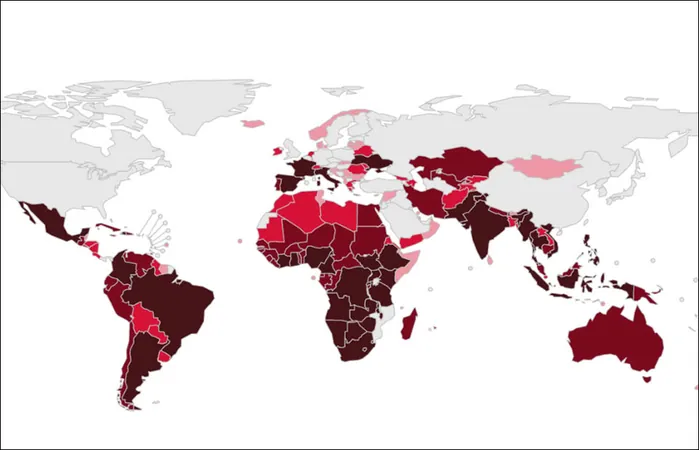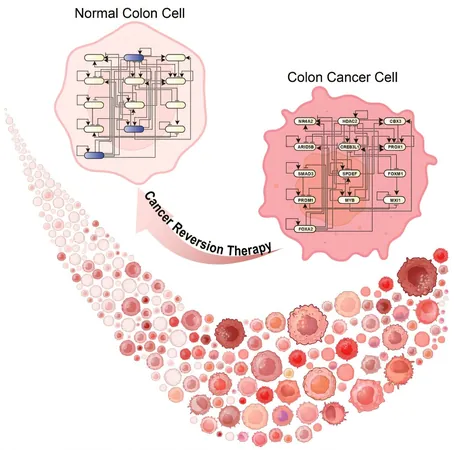
Sip Your Way to Health: New Research Shows Tea and Coffee May Lower Head and Neck Cancer Risks!
2024-12-23
Author: Sarah
If sipping your favorite tea or coffee is the highlight of your day, there’s reason to celebrate! Groundbreaking research indicates that people who regularly drink these beverages may face a slightly lower risk of developing head and neck cancers. While the study doesn't definitively prove that tea and coffee are protective against these cancers, it opens up new avenues in understanding the complex relationship between diet and cancer risk.
In the UK alone, approximately 12,800 new cases of head and neck cancer are diagnosed each year, with around 4,100 associated deaths, according to Cancer Research UK. These alarming statistics have prompted ongoing research into lifestyle factors that could reduce these numbers.
Dr. Yuan-Chin Amy Lee, senior author of the study from the Huntsman Cancer Institute and the University of Utah School of Medicine, highlighted that previous studies yielded inconsistent results regarding the effects of coffee and tea on cancer risk. This recent research aimed to clarify those findings by examining their specific impacts on head and neck cancer subtypes. Remarkably, it was found that decaffeinated coffee also seemed to have a positive association with reduced risks, which warrants further exploration.
The comprehensive analysis included data from 14 distinct studies spanning across Europe, North America, and Latin America. Participants were surveyed about their tea and coffee consumption, including decaffeinated varieties. A total of 9,548 individuals diagnosed with head and neck cancers were compared against 15,783 healthy individuals.
Once researchers adjusted for factors like age, sex, smoking habits, alcohol intake, and fruit and vegetable consumption, a striking finding emerged: individuals consuming more than four cups of caffeinated coffee daily had a 17% lower likelihood of developing head and neck cancers overall. Furthermore, this high level of consumption was particularly associated with reduced risks of cancers affecting the oral cavity and oropharynx, which is located just behind the mouth.
Interestingly, while drinking decaffeinated coffee was tied to a decreased risk of oral cavity cancer, the link with tea consumption unveiled a more complicated picture. Consuming one cup or less of tea per day corresponded with a 9% lower risk of head and neck cancers overall, specifically showing benefits for lower throat cancers. However, drinking more than one cup a day could raise the odds of laryngeal cancer by 38%. Researchers suggest this increase could be related to the connection between tea consumption and gastroesophageal reflux disease, a condition that heightens laryngeal cancer risk.
Of course, no study is without its limitations. The authors acknowledged potential drawbacks such as the reliability of self-reported beverage consumption and the fact that different types of tea and coffee were not evaluated. Experts like Tom Sanders, a professor emeritus of nutrition and dietetics at King’s College London, also pointed out the challenges in filtering out confounding factors—like tobacco and alcohol use—that could skew results.
As always, moderation is key. While tea and coffee could play a role in cancer prevention, a comprehensive lifestyle that avoids smoking, moderates alcohol consumption, and prioritizes a balanced diet is crucial for reducing cancer risk. So next time you reach for that comforting cup of joe or soothing herbal tea, know that you might just be making a beneficial choice for your health!






 Brasil (PT)
Brasil (PT)
 Canada (EN)
Canada (EN)
 Chile (ES)
Chile (ES)
 España (ES)
España (ES)
 France (FR)
France (FR)
 Hong Kong (EN)
Hong Kong (EN)
 Italia (IT)
Italia (IT)
 日本 (JA)
日本 (JA)
 Magyarország (HU)
Magyarország (HU)
 Norge (NO)
Norge (NO)
 Polska (PL)
Polska (PL)
 Schweiz (DE)
Schweiz (DE)
 Singapore (EN)
Singapore (EN)
 Sverige (SV)
Sverige (SV)
 Suomi (FI)
Suomi (FI)
 Türkiye (TR)
Türkiye (TR)